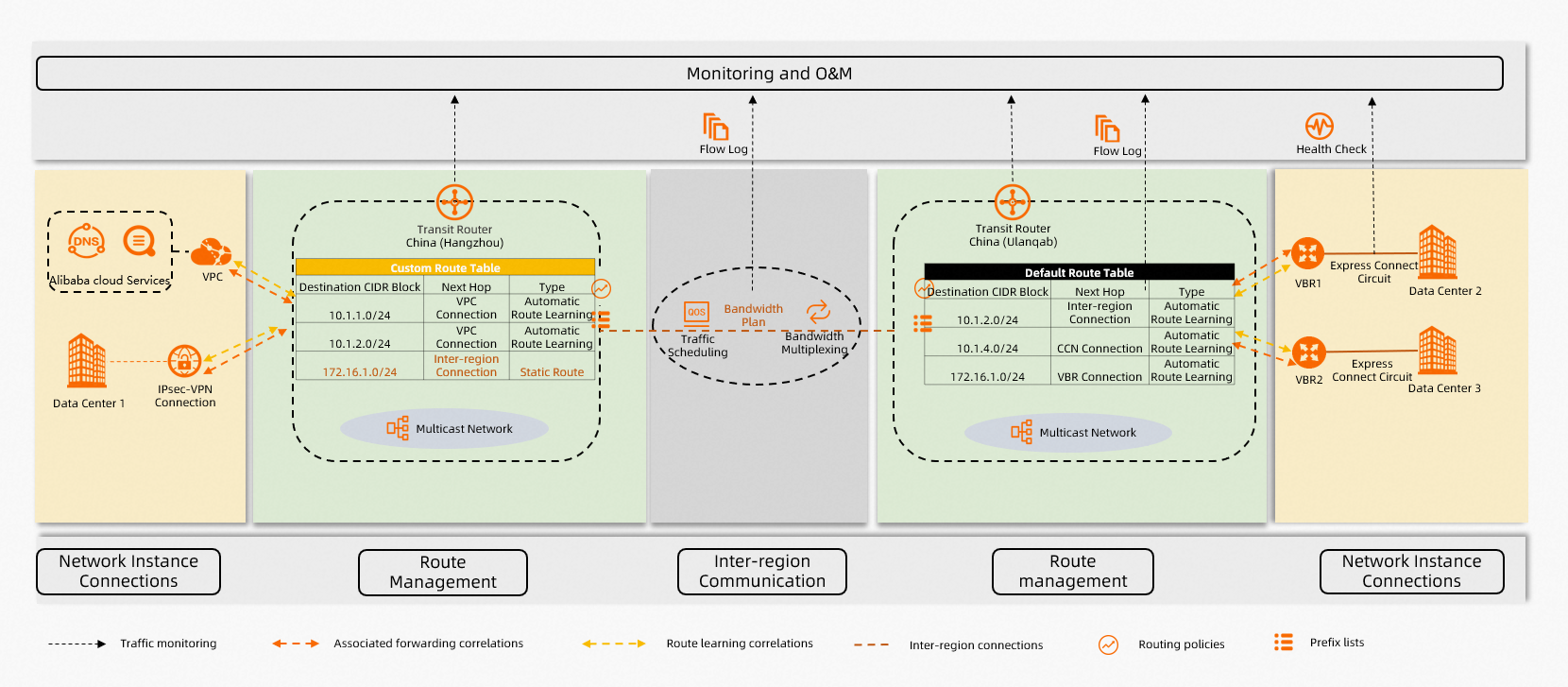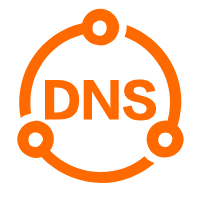Transit routers can connect to virtual private clouds (VPCs), IPsec-VPN connections, and Cloud Connect Network (CCN) instances. You can use transit routers to establish communication across VPCs and regions, and between data centers and cloud resources. Transit routers also support various routing features, such as custom route tables, custom route entries, and routing policies, which allow you to customize networking. In addition, the Cloud Enterprise Network (CEN) console supports visualized monitoring and O&M, which help you monitor network status and improve O&M efficiency. This topic describes the functions and features of CEN.

Functions and features
The following table describes the functions and features of CEN, and the features that are supported by different editions of transit routers.
In the following table, ![]() indicates that the feature is supported, and
indicates that the feature is supported, and ![]() indicates that the feature is not supported.
indicates that the feature is not supported.
Category | Feature | Basic Edition | Enterprise Edition |
VPC connections |
|
| |
Virtual border router (VBR) connections |
|
| |
CCN connections Note Regions of CCN support only Basic Edition transit routers. |
|
| |
IPsec-VPN connections |
|
| |
Transit router connections |
|
| |
Bandwidth plans |
|
| |
Inter-region connections |
|
| |
Bandwidth multiplexing |
|
| |
Traffic scheduling |
|
| |
Custom route tables |
|
| |
Custom route entries |
|
| |
Associated forwarding |
|
| |
Route learning |
|
| |
Prefix lists |
|
| |
Route synchronization |
|
| |
Aggregate routes |
|
| |
Routing policies |
|
| |
Multi-region equal-cost multi-path (ECMP) routing for VBRs |
|
| |
Access to cloud services |
|
| |
Access to PrivateZone |
|
| |
Multicast networks |
|
| |
Bandwidth plan monitoring |
|
| |
Inter-region connection monitoring |
|
| |
Express Connect circuit monitoring |
|
| |
Network instance connection monitoring |
|
| |
Health checks |
|
| |
Flow logs |
|
| |
Transit router diagnostics |
|
| |
Reachability analyzer |
|
|
Network instance connections
VPC Connections
You can attach VPCs that you want to connect to a transit router. After you attach the VPCs to a transit router, you can use the transit router to establish private network connections.
VBR Connections
You can attach VBRs that you want to connect to a transit router. After you attach the VBRs to a transit router, you can use the transit router to establish private network connections.
CCN Connections
You can attach CCN instances that you want to connect to a transit router. After you attach the CCN instances to a transit router, you can use the transit router to establish private network connections.
IPsec-VPN Connections
After a data center is connected to a transit route over an IPsec-VPN connection, the data center can communicate with other networks that are attached to the transit router.
Inter-region communication
Bandwidth Plans and Inter-region Connections
An inter-region connection refers to a connection between transit routers that are deployed in different regions. To create an inter-region connection, you must use a bandwidth plan.
Bandwidth Multiplexing
The bandwidth multiplexing feature of CCN allows you to share inter-region bandwidth resources between a CCN transit router and a regional transit router. This facilitates configurations and allows you to use bandwidth resources in a more flexible manner.
Traffic Scheduling
Traffic scheduling marks inter-region traffic and throttles bandwidth for different types of traffic based on the DHCP values. This ensures that bandwidth resources are properly allocated to each type of service and improves network performance.
Routes
Custom Route Tables
Custom route tables are similar to virtual routing forwarding (VRF) supported by traditional routers. Custom route tables are isolated from the default route table of Enterprise Edition transit routers. Network traffic from different network instances can be isolated based on the associated custom route tables.
Route Learning
Route learning controls how a network instance advertises routes. The routes of a network instance can be advertised to an Enterprise Edition transit router only after you enable route learning between the network instance and the route tables of the transit router.
Associated Forwarding
Associated forwarding controls how the traffic of a network instance is forwarded. An Enterprise Edition transit router can query routes and forward network traffic based on the routes for a network instance only after you enable associated forwarding between the network instance and the route table of the transit router.
Custom Routes
Enterprise Edition transit routers allow you to add static routes and blackhole routes. You can add custom routes to the route table of an Enterprise Edition transit router to control traffic forwarding for network instances.
Prefix Lists
The route tables of Enterprise Edition transit routers can be associated with prefix lists. After the route table of an Enterprise Edition transit router is associated with the prefix list of a virtual private cloud (VPC), the system automatically adds the routes that point to the CIDR blocks in the prefix list to the route table of the transit router.
Route Synchronization
Enterprise Edition transit routers support route synchronization, which enables Enterprise Edition transit routers to automatically advertise routes to network instances.
Aggregate Routes
Specific routes of an Enterprise Edition transit router can be converged into one aggregate route. If route synchronization is enabled for a VPC, the aggregate route, instead of the specific routes, is automatically advertised to the VPC.
Routing Policies
A routing policy controls route advertisement for the route table of a transit router. You can add a routing policy to specify whether to advertise the routes in the route table of a transit router to network instances or other transit routers.
Multi-region ECMP Routing for VBRs
After you enable multi-region ECMP for an Enterprise Edition transit router, the transit router learns routes that have the same destination CIDR block from VBRs, and forwards network traffic based on the ECMP routes.
Cloud services
PrivateZone
PrivateZone is a VPC-based DNS resolution and management service for private domain names. After you attach VBRs and CCN instances to a transit router, on-premises networks that are attached to the CEN instance can access PrivateZone.
Cloud Services
After you attach VBRs and CCN instances to a transit router, on-premises networks that are attached to the transit router can access services deployed on Alibaba Cloud.
Multicast
Multicast Networks
After you attach network instances to an Enterprise Edition transit router, you can create and manage multicast networks. The Enterprise Edition transit router functions as a multicast router that forwards multicast packets between the network instances.
Monitoring and O&M
CEN Monitoring
CEN supports the monitoring feature. You can view the monitoring data of transit routers, bandwidth plans, inter-region connections, Express Connect circuits that are connected to VBRs, and traffic on network instances that are attached to transit routers on the Charts tab.
Health Checks
VBRs can connect data centers to Alibaba Cloud through Express Connect circuits. After you connect a VBR to a transit router, you can use the health check feature to test the connectivity of the Express Connect circuit.
Flow Logs
Flow logs are used to capture information about inter-region traffic between transit routers and traffic over VBR connections. You can use flow logs to analyze bandwidth usage and troubleshoot network issues.
Transit Router Diagnostics
CEN is integrated with Network Intelligent Service (NIS), which can perform diagnostics on transit routers and provide troubleshooting suggestions. You can use this feature to troubleshoot network errors on transit routers based on the diagnosis results.
Reachability Analyzer
CEN is integrated with NIS, which can test the reachability of resources. You can use the reachability analyzer to test the connectivity between resources.























